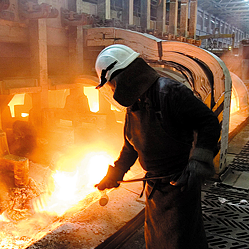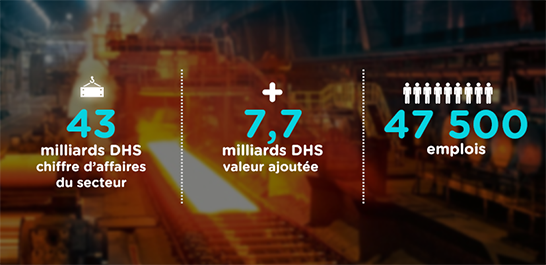INTRODUCTION

Metallurgy and metalworking are the main branches of Mechanical and Metallurgical Industries (IMM): they account for 82% of exports, 94% of investment, 91% of production and 82.6% of employment of IMM.
The IMM sector is an essential link in the manufacturing supply chain, given its role as supplier and subcontractor for many markets (notably construction, energy, transport and agriculture). In this respect the IMM sector can only benefit from the anticipated development of these markets thanks to the support of major national strategies.
Professional federation of the sector:
Federation of Metallurgical, Mechanical and Electronics Industries (www.fimme.ma)
Main companies of the sector:
SONASID, MAGHREBSTEEL, UNIVERS ACIER, YNNA STEEL, MOROCCAN IRON STEEL, SOMASTEEL

Ecosystems
Ecosystems, the cornerstone of the Industrial Acceleration Plan 2014-2020, are designed to reduce sectoral fragmentation and to promote integrated development of industrial activities. The aim is to integrate the local industrial fabric around leading companies by encouraging mutually beneficial partnerships with SMEs, first by acting as catalyst and second by providing perspective and visibility, which in turn bring creativity, a sense of innovation and dynamism.
Appropriate and targeted support is provided to companies in the ecosystems regarding finance, industrial land and training.
The Industrial Development Fund (FDI), operational since 1 January 2015, allocates 3 billion dirhams per year for the period 2014-2120 to ecosystem companies to enable them to realize their ambitions in upgrading, development and internationalization.
State support is also backed up with integrated and competitive bank financing.
The ecosystem companies can also:
As part of the sectoral policy of the Industrial Acceleration Plan an agreement was signed on 2 April 2014 between the Ministry of Economy and Finance, the Ministry of Industry, Trade, Investment and Digital Economy, and the Federation of Metallurgical, Mechanical and Electronics Industries (FIMME). It aims to set up strategic plans for the development of reliable ecosystems in the IMM sector.
-
- Have access to quality industrial land thanks to the innovative concept of industrial rental parks;
- Benefit their employees through relevant staff training courses.
- The ecosystems approach arrives at the right time given the rapid growth of the automotive sector which calls for a greater integration to boost its quality, responsiveness and thus its competitiveness.
ASSISTANCE AND SUPPORT
Appropriate and targeted support is provided to companies in the ecosystems regarding finance, industrial land and training.
The Industrial Development Fund (FDI), operational since 1 January 2015, allocates 3 billion dirhams per year for the period 2014-2120 to ecosystem companies to enable them to realize their ambitions in upgrading, development and internationalization.
State support is also backed up with integrated and competitive bank financing.
The ecosystem companies can also:
Under the Investment Charter, the FPI offers partial coverage by the Government of certain expenses related to the acquisition of property (up to 20% of the cost of land), external infrastructure (up to 5% of the total amount of the investment programme, or 10% in the case of an investment in the sector of spinning, weaving or finishing) and vocational training (up to 20% of the cost of the training).
These contributions may be combined as long as the total contribution of the state does not exceed 5% of the total investment programme; or 10% in the case of investment in the sector of spinning, weaving or finishing; or when the investment project is located in a suburban or rural area.
Eligibility criteria:
The investment project must meet at least one of the following five criteria:
Tax incentives are provided for by article 123-22°-a) of the General Tax Code and Article 7.1 of finance law No. 12-98 for the 1998/9 budget year as amended and supplemented by the following:
The exemption from import duty on capital equipment, materials and tools necessary for the implementation of an investment project with a total cost greater than 200 million dirhams during 36 months after the signing of the investment agreement; this exemption is extended to parts, replacement parts and accessories imported at the same time as the aforementioned equipment;
The exemption from VAT on imports of capital equipment, materials and tools necessary for the implementation of an investment project with a total cost greater than 200 million dirhams until 36 months after the start of activity by the company or from the date of issuance of the building permit, and which may be extended by six months in the event of force majeure (renewable once); this exemption is extended to parts, replacement parts and accessories imported at the same time as the aforementioned equipment.
SMEs in the sector may benefit from special support within the programmes developed by the National Agency for the Promotion of Small and Medium-sized Enterprises (ANPME):
A free trade zone (ZFE) is a specified area of land devoted to export activities for industrial purposes and related service activities. Each free zone is created and delimited by a decree that determines the nature and business activities that can be established there.
The operational free trade zones are located at Tangier (Tanger Free Zone – TFZ and Tanger Automotive City – TAC), at Kenitra (Atlantic Free Zone – AFZ), at Casablanca (Midparc), at Rabat (Technopolis) and at Oujda (Technopole d’Oujda).
To obtain free zone status under law No. 19-94, companies must have obtained authorization from the local commission of the free export zone, which is presided over by the wali or governor of the region, and must make at least 70% of their turnover from exports.
Free zone status allows for the exemption of foreign trade and exchange controls, as well as access to the following state aid:
Tax incentives resulting in:
Customs benefits:
- Have access to quality industrial land thanks to the innovative concept of industrial rental parks;
- Benefit their employees through relevant staff training courses.
- Represent an amount of 200 million dirhams or more over a 3-year period;
- To be located in one of the provinces or prefectures mentioned in Decree No. 2-98-520 dated 5 Rabii I 1419 (30 June 1998);
- Create a minimum of 250 stable jobs over 3 years;
- Provide technology transfer;
- Contribute to the protection of the environment.
- IMTIAZ CROISSANCE
- ISTITMAR CROISSANCE
- AUTO-ENTREPRENEUR
- Exemption from income tax (IR) during the first 5 years, and then a reduction of 80% of tax on gross earned income during the following 20 years;
- Exemption from corporation tax (IS) for the first 5 years, and then a rate of 8.75% for the following 20 years;
- Exemption from professional tax for the first 15 years;
- Exemption from urban tax for the first 15 years;
- Exemption from participation in national solidarity;
- Exemption from tax on income from corporate rights, dividends and similar income for non-residents and a reduction in tax to 7.5% for residents;
- Exemption from import duties, and simplified customs procedures;
- Unlimited exemption from value added tax in respect of products delivered and services supplied to the free export zones and from the subjected territory;
- Administrative facilitations:
- Exemption from registration fees and stamp duty on instruments of incorporation or increases in the capital of the company, as well as on land acquisitions;
- The establishment of a one-stop service to the investor.
TRAINING
The training of human resources is a strategic activity of the Industrial Acceleration Plan 2014-2020. The availability and quality of human resources determine the attractiveness of Morocco as a destination, and increase the productivity and competitiveness of the companies.
Amongst other things the strategy aims at providing the ecosystems in place with skilled profiles.
The detailed mapping of training needs - with a quantification of the human resource requirements by sector, profile, region and year - and the identification of training opportunities available in Morocco are ongoing, which will enable the development of a national training plan.
Consult the list of training needs for performance contracts signed by end - May 2017
Reception Infrastructure
General and sectoral Integrated Industrial Platforms (P2I), possibly benefiting from the free zone status, guarantee the availability of property at an attractive price, comprehensive and diverse real-estate and logistics options conforming to the best international standards, as well as on-site services and a one stop shop for administration.
In the framework of the Industrial Acceleration Plan, the Ministry plans for the mobilization of 1,000 hectares to create Integrated Industrial Rental Parks (PIL) with turnkey premises: each park will include a one stop shop for administration, a local job pool, ad hoc services and a training programme.

